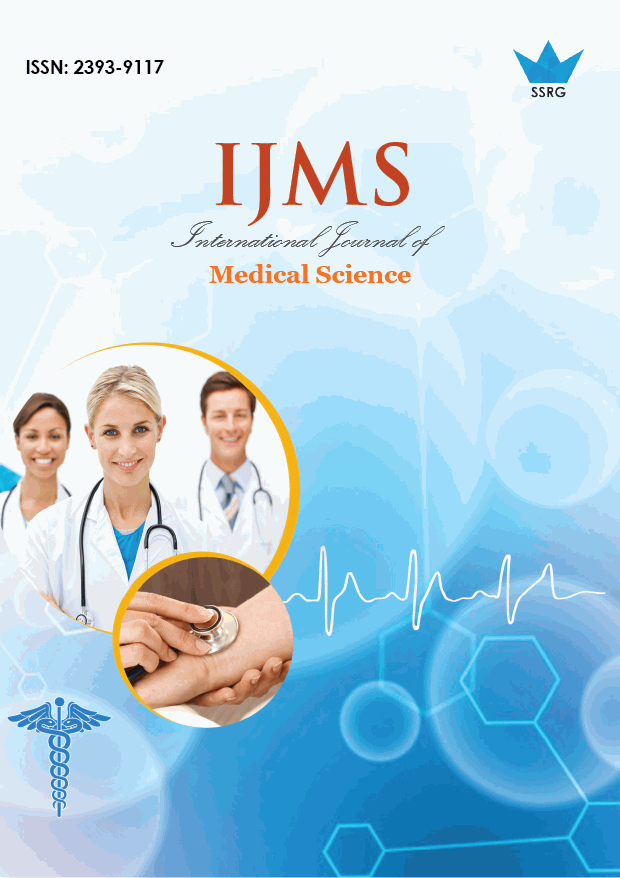Assessment of effectiveness of intravenous Iron Sucrose therapy in pregnant women with Iron Deficiency Anemia

| International Journal of Medical Science |
| © 2020 by SSRG - IJMS Journal |
| Volume 7 Issue 2 |
| Year of Publication : 2020 |
| Authors : Shivali Bhalla, Nayana Pathak |
How to Cite?
Shivali Bhalla, Nayana Pathak, "Assessment of effectiveness of intravenous Iron Sucrose therapy in pregnant women with Iron Deficiency Anemia," SSRG International Journal of Medical Science, vol. 7, no. 2, pp. 4-12, 2020. Crossref, https://doi.org/10.14445/23939117/IJMS-V7I2P102
Abstract:
Iron deficiency anemia is a common medical disorder complicating pregnancy. Oral iron therapy during pregnancy is a common treatment modality, but it is time consuming & not useful in severe cases of anemia as well as its utility is limited by gastrointestinal intolerance leading to poor patients' compliance. Blood transfusion although can promptly and reliably treat anemia, entails risk of cross reactions and viral infections. So, Intravenous iron sucrose is a convenient and reliable solution. Materials and methods: Present study was conducted to study the effectiveness of intravenous iron sucrose in pregnant women with Hemoglobin (6-8 gm/dl) between 24-34 wks gestational age. Results: statistically significant difference (p<0.01) were observed in various laboratory parameters i.e. Hb %,RBC count,reticulocyte count ,PCV,MCV,MCHC, serum ferritin, serum Iron,TIBC before and after treatment. So, it was concluded from our study that the intravenous ferrous sucrose is very safe and effective modality for correcting and replenish iron stores in antenatal iron deficiency anemic mothers.
Keywords:
Iron deficiency anemia; Iron sucrose; Antenatal; intravenous Iron therapy.
References:
[1] De Benoist B, McLean E, Egli, Cogswell M. worldwide prevalence of anemia 1993–2005: WHO global database on anemia; Geneva: World Health Organization; 2008.
[2] World Health Organization [WHO], “The Prevalence of Anemia in Women: a tabulation of available information, “Division of Family Health, Maternal Health and Safe Motherhood Programme, Division of Health Protection and Promotion, Nutrition Programme; WHO, 2nd ed. World Health Organization, Geneva, Switzerland, 1992.
[3] ACC/SCN (United Nations Administrative Committee on Coordination/Standing Committee on Nutrition), “Fifth report on the world nutrition situation: Nutrition for improved development outcomes,” Geneva, Switzerland, accscn@ who.org, 2004.
[4] Momen AK, Meshari A, Nuaim L, et al. Intravenous iron sucrose complex in the treatment of iron deficiency anemia during pregnancy. Reprod Biol 1996; 69: 121-124.
[5] Ragip A, Unlubilgin E, Kanderim O, Yalvac S, Cakir L, Haberal A. Intravenous versus oral iron treatment of anemia in pregnancy: a randomized trial. ObstGynecol 2005; 106:1335-1340.
[6] Rodriguez RM, Corwin HL, Gettinger A, Corwin MJ, Gubler D, Pearl RG: Nutritional deficiencies and blunted erythropoietinresponse as causes of the anemia of critical illness. J CritCare2001, 16:36-41.
[7] A. F. Goddard, M. W. James, A. S. McIntyre, and B. B. Scott, “Guidelines for the management of iron deficiency anemia, “Gut, vol. 46, pp. 1–5, 2000.
[8] Al.RAMd,Unlubilgin,EMd,.KandemirO,etal.Intravenous versus oral iron for treatment of anemia in pregnancy. Obstet Gynecol.2005;106:1335-40.
[9] Shrivastava D, Inamdar S, Bhute S, and Singh A. Effectiveness of intravenous iron sucrose in management of iron-deficient anemia of pregnancy at rural hospital set up. J ObstetGynaecol India. 2012, 62(2):154-57.
[10] Kriplani A, Mahey R, Dash BB, Kulshreshta V, Agarwal N, Bhatla N. Intravenous iron sucrose therapy for moderate to severe anemia in pregnancy. Indian J Med Res. 2013; 138(1):78-82.
[11] Perewunsnyk G, Huch R, and Huch A, Breymann C. Parenteral iron therapy in obstetrics: 8 years experience with iron-sucrose complex. Br J Nutr 2002; 88:3–10.

 10.14445/23939117/IJMS-V7I2P102
10.14445/23939117/IJMS-V7I2P102